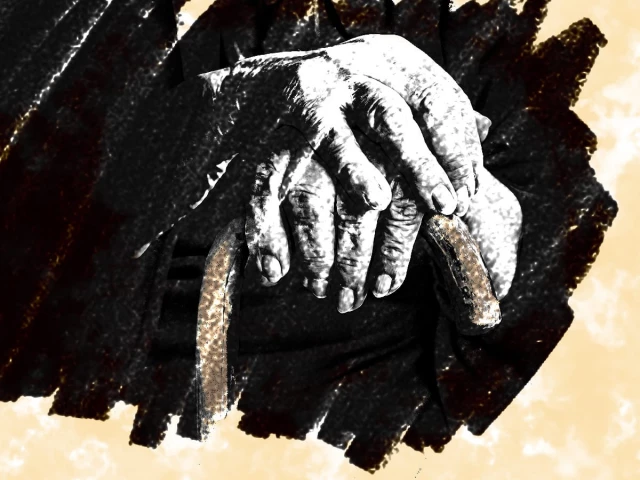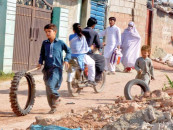Senior citizens survive on the margins
Despite an expanding ageing population, limited healthcare facilities and social neglect have compounded challenges

After spending nearly all their lives fulfilling obligations, citizens crossing their sixties are left ageing in the shadows, with both their families and the state treating them as little more than a burden.
In Pakistan, the elderly population, which stood at 16.5 million in 2023, is projected to reach 36.6 million by 2050, making one in every five Pakistani's a senior citizen. Despite the country's expanding elderly population, Pakistan still offers limited prospects for a dignified, independent, and healthy life for its senior citizens, majority of whom are left without essential services or social security.
One such senior citizen was 80-year-old Muhammad Sharif, a retired government employee living in Lahore's Garhi Shahu area. Once financially stable, he now struggles to survive. "I invested all my retirement funds in my sons' businesses. I have three sons and two daughters, all married. My wife has passed away, and now I'm completely dependent on my children, who consider me a burden," sorrowfully shared Sharif.
Sharif has attempted to get admission into old age homes several times but was denied due to his age and illnesses. Suffering from diabetes, high blood pressure, and extreme physical weakness, he relies on support to move. "I've now accepted that I'll spend the rest of my days on this charpai (bed)," regretted Sharif, whose story reflects the daily struggles faced by countless elderly individuals across Pakistan.
Down south in Karachi, Aslam Shah, a 70-year-old resident of Kharadar, revealed that he suffered from multiple health problems and had to stand for hours in a long queue at the Jinnah Hospital for a simple checkup. "I have to wait two or three hours before seeing a doctor, two more hours to get bloodwork done and an additional two to three hours to get the reports reviewed by the doctor. There are no seating or water arrangement for senior citizens at public hospitals," lamented Shah.
Professor Asghar Zaidi, a public policy expert at the University of Management and Technology (UMT) Lahore, who is also affiliated with Oxford University's Institute of Population Ageing, emphasized the need for immediate and impactful policy reforms in line with the WHO's concept of "healthy aging."
"Geriatric healthcare should be made a national priority by training doctors in elderly care and establishing dedicated geriatric units in all major hospitals. There is also a need for expanding health insurance for seniors and launching a Universal Social Pension scheme to ensure a basic income for all elderly citizens," implored Zaidi, who stressed the importance of promoting community-level social engagement programs, launching awareness campaigns against ageism, and developing a nationwide system for in-home elder care and caregiver training.
On the other hand, Fatima Tahir, a clinical psychologist, implored that in addition to physical ailments, senior citizens also faced psychological distress due to loneliness and neglect. "This is the stage of life where comfort, dignity, and social support are crucial, but sadly, these are missing from our society," said Tahir.
In Punjab, despite the approval of the Senior Citizen Act 2023 by the cabinet committee, the bill remains stuck in the legislative pipeline, Similarly, in Sindh, in 2016, the Sindh Senior Citizens Act was passed, proposing free treatment in government hospitals and a 25 per cent discount at private hospitals. However, for a province with an elderly population of more than 55.7 million, senior citizens await welfare facilities till date.
Dr Murtaza Khuhro, a local lawyer and public welfare activist, confirmed that the law pertaining to senior citizens needed publicity hence most people were unaware of it. "About 5 per cent of the population of the province is 60 years of age or above and their welfare is the responsibility of the government. A publicity campaign should be launched through television and newspapers to raise awareness among the people, It should last for at least two years," urged Dr Khuhro.
Farida Yameen, Head of the Sindh Senior Citizens Council, revealed that the process of registration of people above 60 years of age was still underway, and no senior citizen card had been issued to anyone so far. According to Provincial Minister for Social Welfare Mir Tariq Talpur, 25,000 to 30,000 cards have been prepared and will be distributed soon.
Meanwhile, officials from the Punjab Social Welfare and Baitul Mal Department have claimed that old age homes have been set up in six cities, including Lahore, with the capacity to accommodate 50 senior citizens per center. The facilities also offer free access to public transport and recreation for people over the age of 60. However, on-ground realities tell a different story.
Differing with the state officials' statements, Shehzad Khaskheli, Director of the Foundation for Ageing and Inclusive Development (FAID), pointed out that although laws were in place across the provinces, implementation remained minimal.






















COMMENTS (1)
Comments are moderated and generally will be posted if they are on-topic and not abusive.
For more information, please see our Comments FAQ